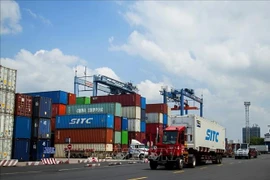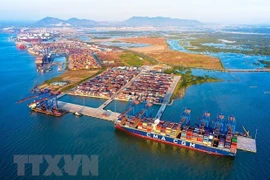Hanoi (VNA) - Vietnam’s GDP growth is projected to reach 7.5% under normal conditions and up to 8% in an optimistic scenario for 2025, according to a research group at the Bank for Investment and Development of Vietnam (BIDV).
This outlook was shared by Dr. Can Van Luc, Chief Economist at BIDV, during a recent seminar reviewing Vietnam's macro-economic performance in 2024 and exploring prospects for 2025. However, he noted that achieving such ambitious growth rates will be a challenge.
Global economic growth is expected to decelerate further, with a rate of 3.2% in 2024 as compared with the 3.3% in the previous year, well below the 3.5% average during 2011-2019 period.
In addition, geopolitical risks remain high, and uncertainties surrounding global trade policies are growing. Luc highlighted the potential increase in trade tariffs following the inauguration of President-elect Donald Trump.
These global challenges will make it harder for Vietnam to sustain robust export and investment growth. Despite ongoing efforts to boost public investment, its contribution to GDP growth will likely remain modest.
Luc pointed out that social investment accounts for approximately 37–40% of GDP, with the private sector contributing 56%. Meanwhile, final consumption, encompassing both public and private spending, makes up about 62.5% of GDP. He emphasised that Vietnam’s economic momentum in 2025 will rely heavily on domestic resources.
Challenges for businesses
Despite the emphasis on private sector-driven growth, the economist expressed concerns over the numerous obstacles for businesses. These include unresolved legal issues related to land, challenges in land valuation, rising input costs - such as significant wage hikes and logistics costs that have surged by 30% and an uneven recovery of orders.
The government’s ongoing apparatus restructuring could also affect the efficiency of administrative procedures, he added.
Such challenges are slowing the pace of private investment growth, he stated, elaborating that while private investment saw some recovery in 2024, increasing to around 7% compared to 2.7% in 2023, it remained far below the pre-COVID-19 rate of 17%.
Dr. Nguyen Minh Thao, Head of the Business Environment and Competitiveness Department at the Central Institute for Economic Management (CIEM), highlighted a slowdown in new enterprise growth. Before the pandemic, the ratio of new businesses to those exiting the market was typically 3:1. It had dropped to 1.26 in 2023, and 1.18 last year.
She identified institutional barriers as a significant impediment, ranging from regulatory issues to ineffective implementation. Even efforts to address these barriers often lack comprehensive solutions, focusing narrowly on specific sectors.
“Many businesses operate across multiple industries, so while reforms in one area may benefit them, persistent challenges in others continue to hinder their operations,” Thao explained. Local enterprises also reported a slowdown in reform initiatives compared to previous years.
Achieving higher growth targets - especially the rates exceeding 8% - will be difficult without substantial progress in private sector expansion.
“Despite 35 years of private sector development, starting with the Company Law and the Law on Private Enterprises in 1990, businesses still face numerous hurdles,” said Nguyen Duy Ninh, CEO of Ho Guom Group. He noted that while mechanisms and policies often impose additional burdens, supportive measures frequently remain unimplemented.
For instance, the Law on Support for Small- and Medium-Sized Enterprises (SME Law), enacted in 2017, includes provisions for preferential corporate income tax rates that have yet to take effect. Additionally, credit guarantee funds remain underutilised, despite holding significant reserves.
Luc suggested the introduction of a new resolution on private sector development to replace Resolution 10-NQ/TW of 2017, as many of its key objectives have not been effectively realised.
At the seminar, researchers from the Vietnam Institute for Economic and Policy Research (VEPR) proposed six policy groups to achieve the best-case growth scenario.
“All recommendations aim to improve the business environment,” said Dr. Nguyen Quoc Viet, Deputy Director of VEPR. He emphasised the importance of fostering innovative and sustainable business for enterprises, as they are the primary drivers of economic growth./.
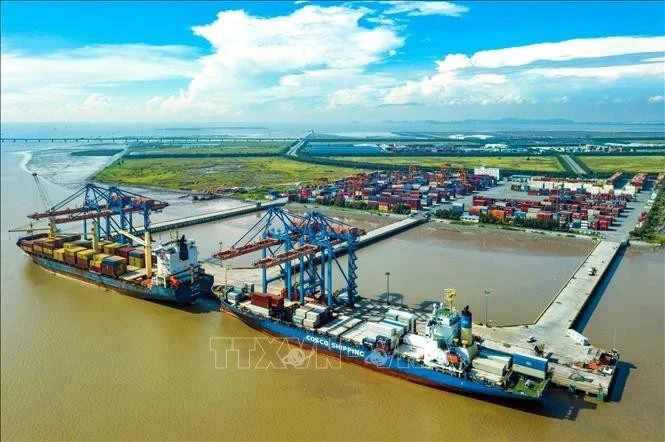
See more

Makara Capital urged to help Vietnam build international financial centres
Deputy Prime Minister and Minister of Foreign Affairs Bui Thanh Son hosted a reception in Hanoi on January 15 for Ali Ijaz Ahmad, Chief Executive Officer of Singapore-based Makara Capital, urging the group to support Vietnam in developing international financial centres.

Mekong Delta food producers busy with production for Tet
Food producers in the Cuu Long (Mekong) Delta are ramping up production under their 'One commune - One product' (OCOP) programme to meet demand for the upcoming Tet (Lunar New Year) festival.

Reference exchange rate drops 8 VND on January 15
The State Bank of Vietnam set the daily reference exchange rate for the US dollar at 24,338 VND/USD on January 15, down 8 VND from the previous day.

Only 9% of households in Vietnam own a car
Only 9% of households in Vietnam own a car, data from a mid-term population and housing survey for 2024 from the General Statistics Office (GSO) shows.

Quang Ninh sets land clearance as priority for FDI attraction
The northern province of Quang Ninh is on a mission to cement its status as one of Vietnam's premier destinations for foreign direct investment (FDI), with a strategic focus on land clearance for industrial park infrastructure projects this year.

European start-up enters Vietnam's ride-hailing market
Bolt, an Estonian ride-hailing start-up, plans to enter Vietnam's market by launching a series of recruitment ads on social media.

Vietnam, US cooperate in developing sustainable industry toward net-zero
A workshop themed US-Vietnam Getting to Net-Zero: Roadmap to Sustainable Industrial Development was held in Ho Chi Minh City on January 14 by the US Commercial Service in the city, in partnership with the International Financial Centre (IFC) and Saigon Tel.
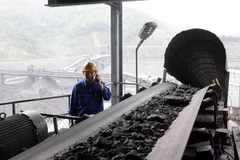
Nearly 3 million tonnes of coal to be extracted to meet January demand surge
The demand for coal is projected to rise sharply this month, particularly for power plants, given lower rainfall and increased production to prepare for the upcoming Lunar New Year celebration.
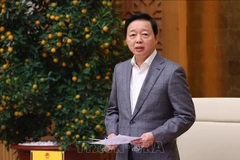
Deputy PM orders enhanced fishery management tools
Deputy Prime Minister Tran Hong Ha has asked the Ministry of Agriculture and Rural Development to complete the comprehensive integration and smooth connectivity to the national fisheries database (VN-Fishbase), vessel monitoring system (VMS), and electronic traceability system (eCDT) in Q1, ensuring seamless data flow from central to local authorities, a move to clamp down on illegal, unreported and unregulated (IUU) fishing.

Majority of credit institutions expect profit growth in 2025
The majority of credit institutions forecast their business performance in the first quarter and the whole year of 2025 will be more positive than that last year, the latest survey of the State Bank of Vietnam (SBV) shows.
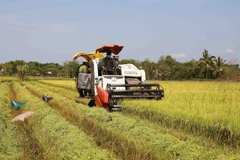
Opportunities, challenges in store for rice exports after New Year
After a record year in 2024 export volume and value, Vietnam’s rice sector is moving into a new year of challenges and opportunities, with significant swings expected in both supply and demand for rice on the world stage.
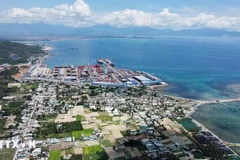
Huge room for Khanh Hoa to expand cooperation with Chinese firms: official
With its strategic importance in the central key economic region, well-developed and interconnected infrastructure, coupled with ample potential for tourism development, Khanh Hoa province is an ideal location for Chinese businesses to seek opportunities for cooperation and investment, Vice Minister of Foreign Affairs Pham Thanh Binh has said.

Businesses must embrace new trends to boost exports to US: experts
Trade cooperation between Vietnam and the US presents both vast opportunities and significant challenges, as the latter enters a new phase with major adjustments to its economic and foreign policies, which are expected to have a wide-reaching impact on global trade and investment activities.

Vietnamese Business Association in UK sets 2025 agenda
The Vietnamese Business Association in the UK (VBUK) has announced plans to reshape the landscape of Vietnam-UK trade relations, focusing on driving business community forward, fostering its unity and strengthening connections with their Vietnamese partners both at home and abroad.

Vietnam eyes 8 billion USD in fruit, vegetable export value in 2025
Vietnam's fruit and vegetable sector aims to achieve 8 billion USD in export revenue in 2025, building on significant market expansion and sound growth, according to the Vietnam Fruits and Vegetables Association (VINAFRUIT).
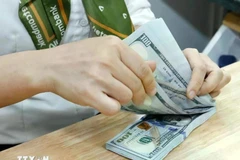
Reference exchange rate continues to rise on January 14
The State Bank of Vietnam set the daily reference exchange rate for the US dollar at 24,346 VND/USD on January 14, up 3 VND from the previous day.

Vietnam’s int’l financial centre development draws Argentine media’s acclaim
Argentine media has lauded Vietnam’s landmark decision to establish an international financial centre in Ho Chi Minh City – the nation’s economic and commercial powerhouse, marking a pivotal shift in the Government’s economic development strategy.
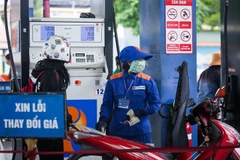
Gasoline prices will not fluctuate much in 2025: expert
Global gasoline prices will not fluctuate much in 2025, according to Doan Quyet Tien, an expert from the Vietnam Petroleum Institute (VPI).
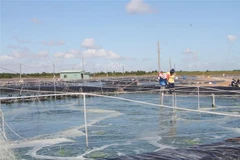
Bac Lieu aims for 1.2 billion USD in shrimp exports in 2025
In 2025, the Mekong Delta province of Bac Lieu aims to earn 1.2 billion USD from exporting shrimp, one of the key export products that accounts for over 95% of its total export value.

Honda Vietnam reports growth in both motorcycle, auto sales in 2024
Honda Vietnam Co., Ltd. has recently reported growth in both motorcycle and automobile sales in 2024, with year-on-year increases of 2.8% and 19%, respectively.
